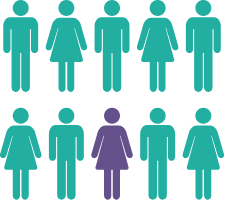
Not a real patient.
BRCA by the Numbers
About 1 in 10 people with breast cancer has a BRCA mutation.
Hear from Jessica, a real breast cancer patient, about her BRCA testing experience.
When it comes to BRCA mutation testing—don’t wait. Getting a BRCA mutation test early can give your doctor important information that can help you get the treatment that’s tailored for you.
Who Should Consider BRCA Mutation Testing?
If you have been diagnosed with TNBC or HR-positive breast cancer, knowing if you have a BRCA mutation could make a difference in your treatment. Your BRCA status is a clinical characteristic your healthcare team can use to make decisions about your treatment plan.
The American Society of Clinical Oncology (ASCO) and the Society of Surgical Oncology (SSO) recommend germline BRCA mutation testing at breast cancer diagnosis:
- for all newly diagnosed patients who are 65 years or younger, and
- for select people older than 65 years based on personal history, family history, ancestry, or eligibility for certain targeted treatment options
A family history of certain cancers, such as breast, ovarian, and prostate cancers, may suggest that a BRCA mutation runs in your family. Genetic testing can help you understand your risk of developing certain cancers. This can help you and your provider make informed healthcare decisions.
BRCA Mutation Testing in Breast Cancer
When should I get tested for BRCA mutations?
- Testing after diagnosis can help inform your treatment plan
- Even if you have already started cancer treatment, you can still talk to your healthcare team to see if you should consider genetic BRCA mutation testing
How do I get tested for BRCA mutations?
- Your healthcare team will guide you through the process and help you schedule an appointment for genetic testing. They may refer you to a genetic counselor. If your doctor isn’t familiar with genetic counseling, there are services that can help find the right counselor for you
- A genetic test requires a blood or saliva sample, which will then be sent to a lab. The results may take a few weeks to come back. Your healthcare team will discuss what your results mean and go over your treatment options
- If you test positive for a BRCA mutation, a genetic counselor can help you determine the best testing strategy for you and your family
Talk to your healthcare team about getting BRCA mutation tested. Knowing your results could help you find a treatment that may be right for you.
BRCA Mutations and Breast Cancer Treatment
If you have TNBC or HR-positive breast cancer and test positive for a BRCA mutation, you may be eligible for certain targeted treatment options.
Here’s what you need to know:
- Knowing that you have an inherited BRCA mutation can inform your treatment options, including surgical, chemotherapy and targeted treatments
- If you have a BRCA mutation, you may be eligible for a targeted treatment called a PARP inhibitor
- Tumors that have BRCA mutations are more sensitive to PARP inhibitor treatment. PARP inhibitors work by causing DNA damage that cells with BRCA mutations have trouble repairing. This can cause cell death

Not a real patient.
Once your healthcare team receives your results, they will inform you of your BRCA status. At this point, your doctor may suggest next steps, depending on your results.
What Happens Next?
Once you’ve decided to get BRCA mutation tested, talk to your doctor. They will help decide if you fit the criteria to receive testing.


Not a real doctor
or patient.
Do you have questions about insurance coverage for BRCA mutation testing?


Not a real patient
or caregiver.
Looking for more support resources or information for BRCA mutation-related cancers?


Not real patients.





